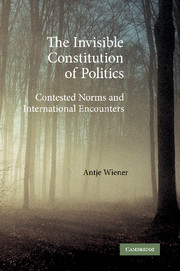Book contents
6 - Democracy and the rule of law
Published online by Cambridge University Press: 22 September 2009
Summary
The rule of law thus stands in the peculiar state of being the pre-eminent legitimating ideal in the world today without agreement on what precisely it means.
(Tamanaha 2004: 4; emphasis in original)Introduction
Two changes in world politics have contributed to the enhanced contestation of normative meanings. Firstly, increasing interaction between communities which are considered – and consider themselves – as belonging to the group of civilised nations in world politics has raised the level of contestedness of norms (compare Table 4.1, condition 3). Secondly, the increasingly routine application of fundamental norms as conditionalities that stand between candidacy and membership of international communities has turned fundamental norms into organising principles. It has also undermined the role of these norms, as substantive meaning has given way to function as a hurdle of sophistication with regard to ‘universal’ standards of democratic governance. In the light of the on-going enlargement negotiations at the time of the interviews (2001–3), which referred to the fundamental norms of democracy and the rule of law, among others, as a condition for membership, this chapter examines the substantive meanings of these norms from the perspective of selected elites from EU member states. The following comparative evaluation indicates an emerging pattern of diversity with regard to these meanings. Thus, it will be demonstrated that fundamental norms (whether they are ‘core constitutional norms’ derived from domestic constitutional frameworks or ‘basic procedural norms’ in world politics, compare Table 4.2, norm-type 1) have sometimes taken on a more shallow meaning.
- Type
- Chapter
- Information
- The Invisible Constitution of PoliticsContested Norms and International Encounters, pp. 121 - 150Publisher: Cambridge University PressPrint publication year: 2008

